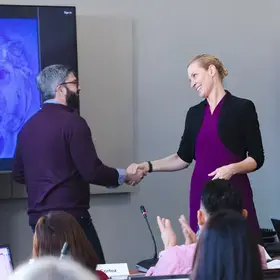By Nick Schiff
Dr. Seth Waldman (’19SPS, Bioethics) may be one of the busiest doctors in Manhattan. He manages to balance his “three full-time jobs” while completing his Master of Science in Bioethics at Columbia University’s School of Professional Studies.
A practicing anesthesiologist, he serves as Director of the Division of Pain Management at Hospital for Special Surgery, is the Medical Advisor for Opioid Practices at the hospital, and was one of the founders of the Tri-Institutional Pain Management Fellowship at Weill Cornell Medical College.
Several years ago, he was asked by the Department of Justice and the Drug Enforcement Administration to be a consultant on opioid crime prosecutions.
To every aspect of his career, the affable, soft-spoken doctor brings a deep moral curiosity. It’s no wonder he has been listed in New York Magazine’s “Best Doctors in New York” issue every year since 2001.
Here, he gives us a look inside his quest to shine the light of ethics onto the entire medical field.
What drew you to bioethics?
At every stage in my career, bioethical questions have arisen. When I was 15, I worked in an animal research facility, and our treatment of the animals raised a lot of questions for me. In 1988, I was a surgical and medical resident in Manhattan during the AIDS crisis. Due to the scale of the epidemic, we were sometimes forced to turn critically ill patients away from our ICU because of insufficient resources. Now, we’re in the midst of an opioid epidemic, which has ethical dimensions reaching across the pharmaceutical industry, professional duty, prescribing practices, the law, and public policy. Eventually, I realized I needed the tools to pursue this in a serious way.
How do bioethical concerns impact the pain management field?
Bioethics and pain treatment go hand in hand.
Pain is the most common complaint for which we seek care, and it is entirely subjective. How can we quantify the meaning of someone’s pain to them, their suffering, when every aspect of the experience is not only individual but subject to the bias of the caregiver, jeopardized by exposure of the brain to opioids, or altered by psychological or socioeconomic stress?
How can we understand how to treat people when the research we use is so often influenced by the medical device and pharmaceutical industries?
Do you use your bioethical training in your work with the Drug Enforcement Administration and Department of Justice?
I work with these agencies to evaluate the practice of clinicians whose opioid prescribing practices willfully cause harm. Sometimes this is bad medicine, and sometimes it is also criminal, but there are always bioethical and legal arguments which must be considered. The opioid epidemic is the deadliest public health crisis in the United States, and it is iatrogenic, caused by the medical and pharmaceutical industries. I believe that doctors have a responsibility not only to protect the responsible use of these powerful medications for patients who need them but to ensure that they are used in such a way as to cause as little individual and public harm as possible.
The program at Columbia is very practical in that regard. I’ve gained a better understanding of the moral and philosophical underpinnings of medicine, and that has given me the tools to express my bioethical positions and defend them.
Is it difficult to balance your career with the program?
Yes, to be honest, it’s been really tough. I’m in class one or two nights per week—usually online—with readings and assignments to complete on the other nights, and you have to keep up the pace. Without the program’s flexibility, I could never have done this.
I can’t recommend the program highly enough. I would love to keep taking more classes after I graduate, but at this point, I think I owe some time to my family [laughs].
Overall, is the medical field making advances in ethics?
There is a line from the Talmud, “you are not obligated to complete the work, but neither are you free to desist from it,” and that fits bioethics perfectly. We will never really finish the work of bioethics because every new medical advance brings with it new problems that challenge our understanding.
In an ideal world, bioethics would not just be a graduate program, but an integral part of medical training from the very beginning. In the end, everybody has a stake in this. We will all be on the doctor’s table someday, and on that day you want the person caring for you to have a grounding in bioethics, and an appreciation of their place in that special relationship.


